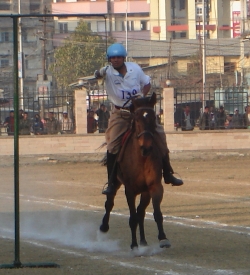 |
 |
![]()
|
Archives |
|
|
A Struggle Against Fear and Time
The first day UNICEF Team Canada met as a team at the 2008 International Tent Pegging Championships was not entirely auspicious. Bimol, my sole English-speaking teammate, served as my translator. However, I needed no help interpreting Jeetender and Talwinder's body language as they weighed our prospects once the other teams rode forward. Tent pegging may be one of the most ancient living equestrian sports, and its following may have spread via empires across the world, but there is no doubting who are its modern superpowers. Oman's national team is under the personal patronage of the country's Sultan, and takes its members from the Royal Cavalry. Its full-time riders travel the world tent pegging, competing in polo, and training under riding masters whose names are legend. The horse holds an almost mystic place in Omani history, and the oil-rich nation is eager to add new equestrian triumphs to those of old. Glory, however, would mean felling the sport's colossus. Tent pegging was born in the Indian Empire 2 500 years ago, and has been largely dominated by India ever since. Its national team draws on the breadth of a subcontinent of more than a billion people, on the depth of a cavalry whose ancestry recalls such storied regiments as the Bengal Lancers, and on the vigour of modern horse-mounted units that still patrol the western deserts and the eastern mountains. For added measure, as host, India was permitted to field not one, but two national teams. The 2008 international championships were to be essentially a Homeric struggle for global ascendancy between these two national titans. In this context, even I, a pathological optimist, realised that Jeetender and Talwinder's misgivings about UNICEF Team Canada's hopes might not be entirely misplaced. We began training as best we could in the brief time we had together. My new teammates had been competing in the National Championships in the weeks preceding the International Championships; over the following two days, I would have to build towards a common peak through the individual runs during the first part of the day, while we would develop as a team through group practice runs together during the second part. On the first day, my individual runs were unexceptional. Our group practices, however, were a different matter. Team tent pegging requires riders to mount unfamiliar warhorses bred for bloodlust, and gallop them in formation, while wielding sword or lance to simultaneously smite targets. It demands a ballet of co-operation at a flying tempo. As we gathered at the start of the course, Bimol and Talwinder's horses, Renu and Raja II, lunged for one another's throats. Jeetender's horse Rajkumar spun about on his forehand, dealing out deathblows with his hind legs if any other creature came into his orbit. My horse Gagan gave vent to his rage by gnawing on my riding boot as I struggled to keep him from the fray. After a few runs, we dismounted and considered one another gravely. My teammates were prepared to entertain unorthodox measures, and I suggested one: we abandoned our practice, and instead unsaddled our horses and allowed them to graze together untroubled. I have encountered many horses and people who appeared naturally vicious, but were revealed by simple acts of kindness to have been merely grappling with fear. If my teammates and I were apprehensive of the international, our horses were doubtlessly more so: they had been ridden hard during the earlier nationals and could clearly sense that further exertion lay ahead. Released, the horses ate contentedly, and gradually mingled together as they gravitated towards the choicer tufts of grass. With daylight fading, we led our horses back to their stalls and into the care of the grooms. Our team had had almost no practice together, but I hoped that we had gained something better than anything that could come through rote. The first day's pattern would repeat itself the second day, though our horses became marginally more co-operative. I was convinced that if we could continue for another fortnight, perhaps for just another week, we would win their full confidence, and become a team of men and beasts truly able to strive together as one. But we did not have another fortnight, or another week, or even another day. We had until the morning. When we next mounted up, it would be to face our rivals on the field of honour. |
|
|
|
|
|
|
|
Remembering Desmond Tutu |
|
|
My article in the Globe and Mail |
|
CBC News |
|
|
Platforms in Canada’s Federal Election |
|
United Nations |
|
|
My address in the UN General Assembly Chamber |
|
CBC Radio’s The House |
|
|
The dirt on the federal two billion trees programme |
|
|
|

